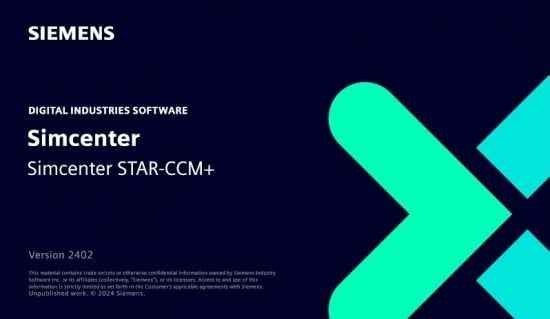
Siemens 公司最近发布最新版:Star CCM+ 2402
全球最全面的单一集成软件环境内工程模拟
STAR-CCM+ 不仅仅只是一个 CFD 求解器,它还是一个解决流体或固体流、传热和应力等相关问题的完整工程过程。
STAR-CCM+ 在解决与多物理和复杂几何形状相关的问题方面拥有无可比拟的优势。 STAR-CCM+ 可在单个程序环境中利用最少的用户投入生产高质量的结果,为此它获得了用户的广泛好评。
Designed to fit easily within your existing engineering process, STAR-CCM+ 可与用户现有的工程流程兼容,帮助用户实现模拟工作流的全自动化,并利用最少的用户互动执行迭代设计研究。
这样有助于工程师花更多时间在实际的工程数据分析上,同时节省更多准备和设置模拟的时间。
以客户满意度为导向的产品
Siemens 致力于通过使用工程模拟帮助公司和组织获得成功。 成功的关键因素就是 STAR-CCM+。
File Size: 4.3 GB
Predicting the real-world performance of a product requires simulation tools that span a variety of engineering disciplines. STAR-CCM+ is an all-in-one solution that delivers accurate and efficient multidisciplinary technologies in a single integrated user interface.
Why STAR-CCM+?
Don’t just simulate, innovate!
In order to design better products, engineers need to predict the consequence of any design changes on the real-world performance of their product, for better or for worse. Historically those predictions came from hand calculations or from the experimental testing of physical prototypes. Today, engineering simulation offers comprehensive predictions that are usually more accurate and always less expensive than experimental testing. Deployed effectively, these can be used to improve a design through multiple iterations. Ultimately this results in higher quality and more robust products that better fulfill customer expectations. Unlike other methods, engineering simulation also offers the benefit of exploring the performance of a product over the full range of operating conditions that it is likely to face in its working life, rather than just at a handful of carefully chosen “design points.” However, not all engineering simulation tools are created equal. In order to provide a constant stream of relevant engineering data, simulation software must be
Multidisciplinary
Solving complex industrial problems requires simulation tools that span a multitude of physical phenomena and a variety of engineering disciplines. Real-world engineering problems do not separate themselves into convenient categories such as “aerodynamics”, “hydrodynamics”, “heat transfer” and “solid mechanics”. Only multidisciplinary engineering simulation can accurately capture all of the relevant physics that influence the real-world performance of a product, and can be used to automatically drive the virtual product through a range of design configurations and operating scenarios. By minimizing the level of approximation, engineers can be confident that the predicted behavior of their design will match the real-world performance of their product.
Timely
No matter how “realistic” your simulation is, the data it provides is useless if it does not influence the final design of your product. For simulation to be a useful tool in the engineering design process, predictions must be delivered on time, every time. A late simulation result is not much better than no result at all. Ideally, simulation should generate a constant stream of data that guides and informs the design process through every decision. This is only possible when the simulation process is a robust and automated one. Once an engineer has invested in the creation of a multidisciplinary simulation model, that model should be easily redeployable to investigate a full range of design configurations and operating scenarios, with little or no manual effort from the engineer.
Affordable
Used effectively, engineering simulation consistently delivers a high return on investment (ROI). It provides far more in terms of reduced development costs and increased product revenue than it costs to implement. However, traditional engineering simulation licensing schemes can make the transition from an experimentalist’s mindset of “testing just a few design points” to “investigating the whole design space” prohibitively expensive. This is because most engineering simulation software vendors base their licensing model around the broken paradigm of “the more you use, the more you lose,” charging you per core instead of per simulation and tying customers to an almost linear relationship between the cost of their license and the maximum number of cores that they are allowed to utilize in their simulations. Innovative licensing schemes such as Power Sessions (giving you unlimited cores for a fixed price), Power-on-Demand (enabling you to run on the cloud) and Power Tokens (giving you unprecedented flexibility and facilitating design exploration) render the cost of using engineering simulation affordable.
Backed by experts
An uncomfortable truth about modern engineering is that there really are no easy problems left to solve. In order to meet the demands of industry, it is no longer good enough to do ‘a bit of CFD’ or ‘some stress analysis’. In order to design truly innovative products, engineers are often “pushing back the boundaries of the possible”. This is something that is difficult to achieve in isolation, and often requires competences outside an individual engineer’s immediate area of expertise. In order to be successful, an engineer should have ready access to a community of simulation experts, and ideally an established relationship with a dedicated support engineer who not only understands the engineer’s problems, but can approach the right expert help whenever needed.
Whats New
official site does not provide any info about changes in this version.
Homepage
转载请注明:0daytown » Siemens Star CCM+ 2402 Build 19.02.009 Single Precision x64 Multilingual